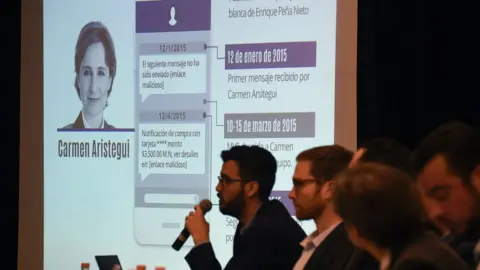Mexico 'spied on journalists, lawyers and activists'
 Getty Images
Getty ImagesSeveral prominent journalists and activists in Mexico have filed a complaint accusing the government of spying on them by hacking their phones.
The accusation follows a report in the New York Times that says they were targeted with spyware meant to be used against criminals and terrorists.
The newspaper says messages examined by forensic analysts show the software was used against government critics.
A Mexican government spokesman "categorically" denied the allegations.
The report says that the software, known as Pegasus, was sold to Mexican federal agencies by Israeli company NSO Group on the condition that it only be used to investigate criminals and terrorists.
The software can infiltrate smartphones and monitor calls, texts and other communications, the New York Times said. It can also activate a phone's microphone or camera, effectively turning the device into a personal bug.
But instead of being used to track suspected criminals, the targets allegedly included investigative journalists, anti-corruption activists and even lawyers.

How does the software work?
- A link is usually sent in a message to a smartphone. If the person taps on it, the spyware is installed, and huge amounts of private data - text messages, photos, emails, location data, even what is being picked up by the device's microphone and camera - is hacked
- Very little is known about NSO Group, the secretive Israel-based company behind Pegasus, but security researchers have called it a cyber arms dealer. The company was thought to be worth $1bn (£780m) in 2015
- The company has acknowledged that it sells tools to governments but has given very little details about who its customers are. It has said, however, that it has no control over how its tools are used and for what purpose

Nine people have now filed a criminal complaint. At a news conference in Mexico City, journalist Carmen Aristegui accused the state of criminal activity.
"The agents of the Mexican state, far from doing what they should be doing legally, have used our resources, our taxes, our money to commit serious crimes," she said.
A spokesman for President Enrique Peña Nieto rejected the allegations, saying that the government carries out intelligence work against the organised crime and threats to the national security in accordance with the country's laws, but that it does not include journalists or activists.
"The government categorically denies that any of its members carries out surveillance or interference in communications of defenders of human rights, journalists, anti-corruption activists or any other person without prior judicial authorization," a spokesman told the BBC.

The alleged cases
 Getty Images
Getty Images- Miguel Agustín Pro Juárez Centre: One of the most respected human rights groups in Mexico, it has looked into the disappearance and suspected massacre of 43 students in 2014 and other high profile cases, including a military raid that left 22 dead in 2014. Its executive director and two other senior executives allegedly received infected messages
- Aristegui Noticias: Award-winning journalist Carmen Aristegui, who also hosts a daily programme on CNN en Español, has reported on suspected cases of corruption and conflict of interest, including a scandal involving the wife of President Enrique Peña Nieto acquiring a $7m (£5.5m) house from a government contractor. Two members of her investigative team and her under-age son allegedly received some 50 messages
- Carlos Loret de Mola: A popular journalist at leading TV network Televisa, he allegedly received several messages containing the software
- Mexican Institute for Competitiveness (IMCO): It has led efforts for anti-corruption legislation. Two senior members were allegedly targeted.
